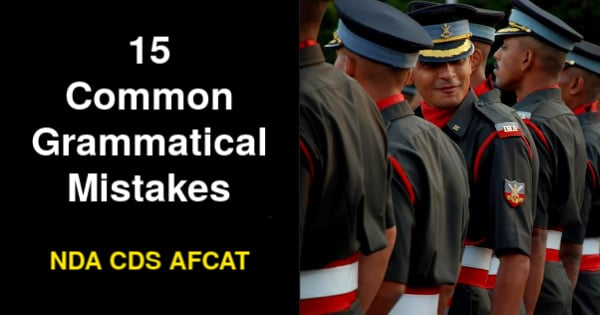India is a country with the second highest number of English-speaking populations. A huge number of native English speakers make frequent English slip-ups. Hence, it’s not uncommon for a non-native English speaker to commit grammatical mistakes in writing as well as in conversations in English Language. Grammatical errors come in many forms and can easily confuse and obscure meanings. But to correct your grammatical errors in English, you first need to realize that you are committing the mistakes. Well, you can start by checking through the following list of 15 most common grammatical mistakes, finding out which of them resonate with you the most and making a mental note of them the next time you attempt to write or speak in English.
Defence Exams Online Courses
- NDA 2020 Online Course
- CDS 2020 Online Course
- AFCAT 2020 Online Course
- INET 2020 Online Course
- Territorial Army 2020 Online Course
- Airmen Group X and Y Online Course
1. Misused Pronouns
While introducing yourself, it is usually observed that the speaker mixes up both the possessive pronoun ‘myself’ and the subject pronoun ‘I’, and sometimes uses ‘Myself’ as the Subject of the sentence and misses the verb in the process.
E.g., Myself Ramesh. / I myself am Ramesh. (Incorrect)
I am Ramesh. (Correct)
2. Misplaced Apostrophes
Apostrophes indicate that a noun owns something. Singular nouns will always add ’s when you’re indicating possession, even if the noun ends with “s.” Plural nouns that do not end in “s” also take an ’s. However, plural nouns that end with “s” have an apostrophe added after the “s.”
E.g.,
- A womans purse was left on the bus. (Incorrect)
- A woman’s purse was left on the bus. (Correct)
- Two dogs use the dish. It is the dogs’s dish. (Incorrect)
- Two dogs use the dish. It is the dogs’ dish. (Correct)
3. Capitalization
E.g.,
- one rainy day, i saw sarah at Union street library. (Incorrect)
- one rainy day, I saw Sarah at Union Street Library. (Correct)
In terms of capitalization, ask yourself three questions:
• Is this the first letter in a sentence? If the answer is yes, then you should capitalize that word. In this sentence, the first word is “one,” so “one” should be capitalized.
• Is this the pronoun “I”? If yes, capitalize. “I” should always be capitalized.
• Am I using a name that someone gave to this thing or person? If yes, capitalize. “Sarah” should be capitalized, and “Union Street Library” should be completely capitalized because it’s the given name of a location.
4. Contractions & How to Use Them
- They’re vs. Their vs. There
One’s a contraction for “they are” (they’re), one refers to something owned by a group (their), and one refers to a place (there).
E.g., They’re going to love going there — I heard their food is the best!
Don’t mix it from the next time!
- Your vs. You’re
The difference between these two is owning something versus actually being something. “Your” is possessive while “you’re” is a contraction of “you are”.
E.g., You made it around the track in under a minute – you’re fast!
How’s your fast going? Are you getting hungry?
- Its vs. It’s
“Its” is possessive and “it’s” is a contraction of “it is.” Lots of people get confused because “it’s” has an ‘s after it, which normally means something is possessive. But in this case, it’s actually a contraction.
E.g., It’s disgraceful for a political party to have its members turned against its ideologies.
5. i.e. vs. e.g.
Many people use the terms interchangeably when trying to elaborate on a point, but each one means something different: “i.e.” roughly means “that is” or “in other words,” while “e.g.” means “example given” or “for example.” The former is used to clarify something you’ve said, while the latter adds color to a story through an example.
E.g., I told you my wish before, i.e., I want a car, e.g., a Ferrari as my birthday present.
6. Who vs. That
This one is tricky. These two words can be used when you’re describing someone or something through a phrase.
E.g., Lizzy is my best friend who likes ice cream.
When you’re describing a person, be sure to use “who.” When you’re describing an object, use “that.”
E.g., Her computer is the one that overheats all the time.
It’s pretty simple, but definitely one of the commonest mistakes one may commit often.
7. Who vs. Whom vs. Whose vs. Who’s
“Who” is used to identify a living pronoun. If you asked, “Who ate all of the cookies?” the answer could be a person, like myself (“I did”), or another living being (“the dog did”).
“Whom” is a little trickier. It’s usually used to describe someone who’s receiving something, like a letter.
E.g., To whom will it be addressed?
But it can also be used to describe someone on the receiving end of an action.
E.g., Whom did we hire to join our team?
“Whose” is used to assign ownership to someone. So,
E.g., Who’s sweater is that?
Because the sweater belongs to someone, it should actually be written this way:
Whose sweater is that?
“Who’s,” on the other hand, is used to identify a living being. It’s a contraction for “who is”.
E.g., Who’s responsible for the mess you created?
8. In to vs. Into
Let’s clarify the “into” versus “in to” debate. They’re often confused, but “into” indicates movement (e.g., Sarah walked into the office.) while “in to” is used in lots of situations because the individual words “to” and “in” are frequently used in other parts of a sentence. For example, “to” is often used with infinitive verbs (e.g., “to drive“) or “in” can be used as part of a verb (e.g., “call in to a meeting“).
So, if you’re trying to decide which to use, first figure out if the words “in” or “to” actually modify other words in the sentence. If they don’t, ask yourself if it’s indicating some sort of movement — if it does, you’re good to use “into.”

9. Use of Commas
Commas are most commonly used to:
- Separate Independent Clauses
You can use commas to separate independent clauses that are joined by “and,” “but,” “for,” “or,” “nor,” “so,” or “yet.” An independent clause is a sentence that can stand on its own. Here’s how to test it: Would the second part of the sentence (following one of those coordinating conjunctions) make a full sentence on its own? If so, add a comma. If it doesn’t, leave it out.
E.g., My brother is very smart, and I’ve learned a lot from him.
- Separate an Introductory Word or Phrase
At the beginning of a sentence, we often add an introductory word or phrase that requires a subsequent comma.
E.g., In the beginning, I had no idea how to use a comma.
However, after reading an awesome blog post, I understand the difference.
Other common introductory words and phrases include “after,” “although,” “when,” and “while.”
10.Use of Semicolons
Semicolons are used to connect two independent clauses that, though they could stand on their own, are closely related.
E.g., Call me tomorrow; I’ll have an answer for you by then.
Notice that each clause could be its own sentence — but stylistically, it makes more sense for them to be joined. (If there’s a coordinating conjunction between the two clauses — like “and,” “but”, or “or” — use a comma instead.)
You can also use semicolons to separate items in a list when those items contain commas themselves.
E.g., There are two options for breakfast: eggs and bacon, which is high in protein and low in carbs; or oatmeal and fruit, which is high in carbs but has more fiber.
11. En Dash vs. Em Dash
Both “–” and “—” are versions of the dash: “–” is the en dash, and “—” or “–” are both versions of the em dash. You can use either the en dash or the em dash to signify a break in a sentence or set off parenthetical statements.
The en dash can also be used to represent time spans or differentiation.
E.g., That will take 5–10 minutes.
The em dash, on the other hand, can be used to set off quotation sources’
E.g., “To be, or not to be, that is the question.” —Shakespeare.”
12. Affect vs. effect
Affect is a verb – “to affect” – meaning to influence or have an impact on something. Effect is a noun – “a positive effect” – referring to the result of being affected by something. There is also a verb “to effect”, meaning to bring something about – “to effect a change”. However, this is not very commonly used.
E.g.,
- He waited for the medicine to have an affect. (Incorrect)
- He waited for the medicine to have an effect. (Correct)
- They were directly effected by the flooding. (Incorrect)
- They were directly affected by the flooding. (Correct)
13. Watch vs. Look vs. See
“See,” “look” and “watch” are often confused in meaning. However, they should be used in different situations. The difference between the three verbs can be explained in the following way:
- Look — to look at something directly.
- See — to see something that comes into our sight that we weren’t looking for.
- Watch — to look at something carefully, usually at something that’s moving.
So, we can “see” something even if we don’t want to, but we can only “look at” something on purpose.
E.g.,
- Stop watching my private journal. (Incorrect)
- Stop looking at my private journal. (Correct)
- I look at the snow falling. (Incorrect)
- I watch the snow falling. (Correct)
- I don’t play tennis, but I look at them playing every day. (Incorrect)
- I don’t play tennis, but I see them playing every day. (Correct)
14. Since vs. For
You use “for” if you don’t have to calculate the period of time, because the amount of time is indicated in the sentence already. You use “since” if you have to calculate the period of time, because you only have the starting point.
E.g.,
- I have known him for always. (Incorrect)
- I saw him since last year. (Incorrect)
- I have lived here for two months. (Correct)
- I have lived here since 1995. (Correct)
15. Dangling Modifiers
This mistake happens when a descriptive phrase doesn’t apply to the noun that immediately follows it.
E.g., After declining for months, John tried a new tactic to increase ROI.
What exactly is declining for months? John? In reality, the sentence was trying to say that the ROI was declining — not John. To fix this problem, try flipping around the sentence structure (though beware of passive voice):
E.g., John tried a new tactic to increase ROI after it had been declining for months.
Better, right? So, the rule is to place the modifier immediately after the noun or pronoun it’s modifying.
Make a mental note of these errors you may commit often while speaking or writing in English. English, like many other languages, has its own set of tricky rules and complexities. But with a little bit of practice and help from guides like this one, you can become an expert in English Grammar. If you are preparing for the defence exams, do not forget to watch my lectures on English Grammer. Download SSBCrackExams Learning App now!













